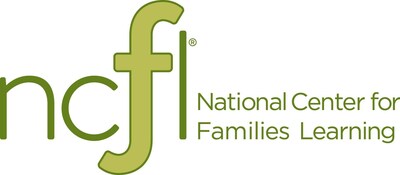Outside the Classroom, Beyond the Textbook: Learning to Engage in Our Community

by Elizabeth Magee
“The families learning class described here was a collaboration between the English Empowerment Center (formerly Literacy Council of Northern Virginia) and Crestwood Elementary School and its Family Center in Springfield, Virginia. The Family Learning Program at the English Empowerment Center employs a four-component, intergenerational family literacy model for adult English learners and their families. Planned and implemented with the learners’ needs and interests in mind, the field trips and activities that follow align with many of the subtopics in the civics education aggregate framework in the Subject Area Frameworks for Adult Learners by World Education.
At Crestwood Family Center, learning English is intertwined with civic engagement. As students and teachers together, we learn English as members of our community. This means that talking, thinking, and doing activities related to community happen in every class, from the first to the last. Field trips are not unusual events but part of our learning from the first day, when we go from our trailer classroom where the adult learners meet for English class to the “Children’s Room” in the school where the children who are also members of our class have their own educational activities. In the Children’s Room, we meet the children’s teachers and sometimes other members of the school community. We also do an activity together, like singing a song with actions or listening to a story. On returning to the adult classroom, we talk about what we had noticed as we passed through the school. We also discuss how we can share responsibility for educating our children. During our course, adults often meet separately from the children; at other times adults go to the Children’s Room for a part of the class time to learn together with the children. The sharing of responsibility for education is what happens when our children go to school— the teachers and school do some of the work, and the parents do some of the work. We share responsibility.
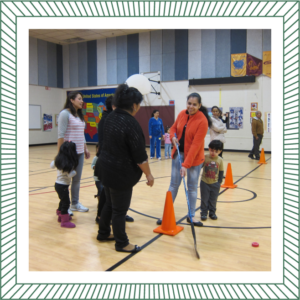 Other short, outside-the-classroom experiences support our learning about community. Every semester, we visit various places in the school and the people who work there. An example is the Main Office, where we meet the principal and assistants and talk about how we as parents and school staff can work together. On another day, we visit the school gym to participate in a sample gym class. Sometimes we go to the cafeteria to meet the workers and to see where the children eat lunch. Sometimes we visit the school library to listen to a story read by a school librarian. These short visits are intended to build understanding of our school community and of opportunities for parents to collaborate with the school in the education of their children.
Other short, outside-the-classroom experiences support our learning about community. Every semester, we visit various places in the school and the people who work there. An example is the Main Office, where we meet the principal and assistants and talk about how we as parents and school staff can work together. On another day, we visit the school gym to participate in a sample gym class. Sometimes we go to the cafeteria to meet the workers and to see where the children eat lunch. Sometimes we visit the school library to listen to a story read by a school librarian. These short visits are intended to build understanding of our school community and of opportunities for parents to collaborate with the school in the education of their children.
We also take longer field trips. Each semester we visit the Fairfax County Adult and Community Education Center near our school. There, we join in on-going adult ESOL classes and learn about vocational classes also offered. We visit the local public library where each of our students receive a library card and learn how to check out and return library materials. We prepare for this library visit from the beginning of our class by talking about the community library as a place which welcomes everyone— babies, grandparents and all in-between—to share in building their own education.
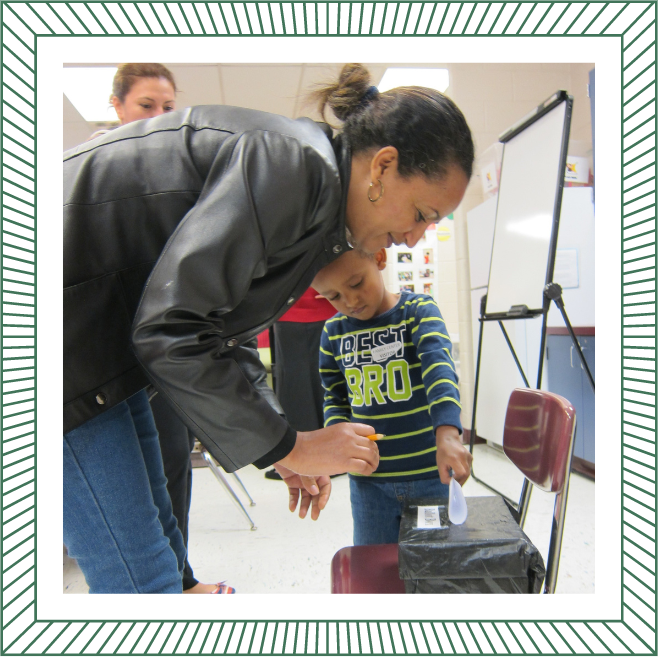 Since Virginia has an election every November, we learn about elections—beginning by observing the many campaign signs that appear on street corners every October. Some of our students are U.S. citizens, so we make sure they are registered and know where and when to vote. In a year of a national election, we always hold a “mock” election with the children in the Children’s Room so that we can use words like ballot, ballot box, count ballots, winner, and loser in context.
Since Virginia has an election every November, we learn about elections—beginning by observing the many campaign signs that appear on street corners every October. Some of our students are U.S. citizens, so we make sure they are registered and know where and when to vote. In a year of a national election, we always hold a “mock” election with the children in the Children’s Room so that we can use words like ballot, ballot box, count ballots, winner, and loser in context.
Guest speakers are also helpful in building understanding of working together as community members. An example is a visit from our school crossing guard, a retired police officer. Many of our students are afraid of police officers, so we invited him to visit our class to talk about what he did to promote safety at school. Although not everything he said was understandable for all students, we were able to follow up in later classes with practice for safe street crossing, something parents need to teach their children.
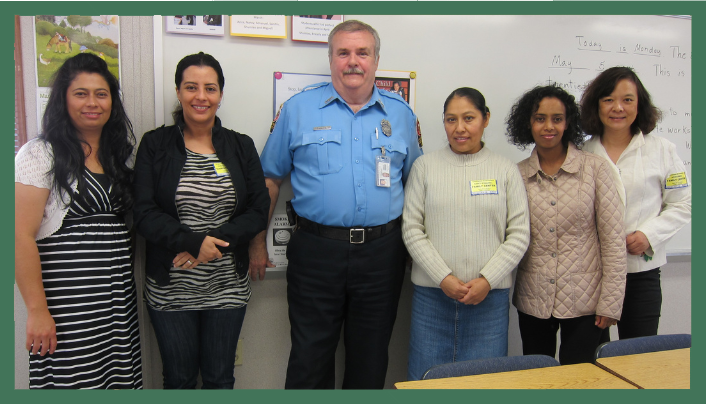 Classroom visits from the School Health Aide and the School Nurse are opportunities for our adult students to learn about school and community immunization rules and health checkups. On one occasion, we had a blood pressure clinic as part of our class. Each student learned about their blood pressure and received referrals for monitoring in cases where the blood pressure appeared high.
Classroom visits from the School Health Aide and the School Nurse are opportunities for our adult students to learn about school and community immunization rules and health checkups. On one occasion, we had a blood pressure clinic as part of our class. Each student learned about their blood pressure and received referrals for monitoring in cases where the blood pressure appeared high.
We are fortunate to hold class within an elementary school since it enables us to see ourselves as part of our community through participation in our school as well as through visiting sites beyond the school itself. Several of our students have become volunteers in their child’s classroom. Being in a school has been an ideal arrangement for learning about our community and thinking about how we might contribute to it.
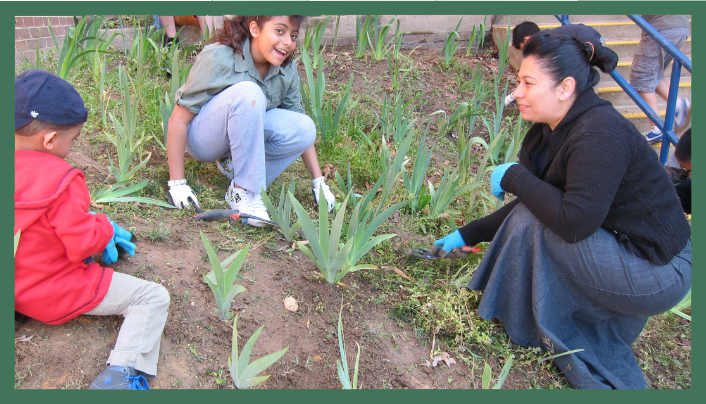
Classes that meet in other locations may need to adapt some of these ideas. It may be good to begin with just one important visit outside the classroom: to the public library nearest you. Libraries are welcoming places. Librarians are always happy to show people around and to talk about their resources. They are trained in answering questions and in helping people find their own answers to questions. Libraries have activities for all age groups, from story hours for preschool children with their parents to events for school-age children and programs for adults. Visiting the library and learning to use its resources can be an ideal beginning for new members of our community as they develop their own education and engage with others to benefit their families.
Our class has learned that education happens not just in classrooms but in the community we live in every day. By going to places in our neighborhood, we got to know people like the librarian, the crossing guard, and the school nurse. We learned how to use resources like the library, the doctor’s office, and the school itself. This helped us feel part of our community. It also taught us that we can work together with community members to support our families. We can share what we learned with others who want to know about community resources. When we help one another learn, the whole community gets stronger.
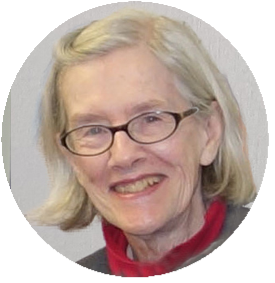
Elizabeth Magee is an instructor at The English Empowerment Center. She has taught in both K–12 schools and adult education in Africa, Asia, and the United States. She particularly enjoys working
together with immigrant parents in the United States to promote education for the whole family.
For the latest resources on family literacy, family engagement, and family leadership; explore the National Center for Families Learning’s (NCFL) library. https://familieslearning.org/resources/
